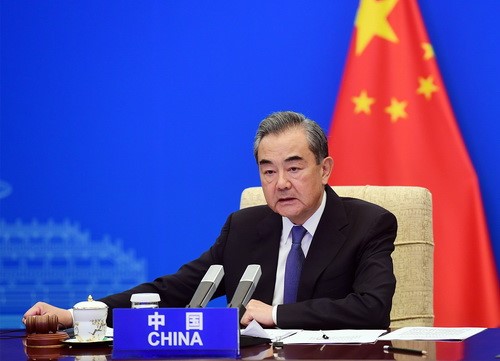China conscientiously fulfills its duty as UN Security Council rotating president
Chinese State Councilor and Foreign Minister Wang Yi chairs the UN Security Council open debate on “Peace and Security in Africa: Addressing Root Causes of Conflict in Post-Pandemic Recovery in Africa" via video link on May 19, 2021. (Photo from the website of China’s Ministry of Foreign Affairs)
China held the UN Security Council’s rotating presidency last month. With a responsible and constructive attitude, China worked closely with the members of the UN Security Council, held in-depth discussion of the issues on the agenda, took swift responses to the tensions in the Middle East in order to practice true multilateralism with real actions and push the Security Council to give play to the important role of maintaining international peace and security.
The council had held 31 meetings during the month, one for each day on average, three of which were at the high level of foreign ministers. The council also adopted the annual Security Council report and four resolutions, as well as two presidential statements, six presidential press statements, and two press elements.
Safeguarding and practicing true multilateralism have been the “keynote” of China’s presidency of the Security Council, which is a concrete manifestation of the concept of building a community with a shared future for mankind and the major country diplomacy with Chinese characteristics, said China’s UN Ambassador Zhang Jun
Uniting countries to tide over difficulties with concrete actions
With the joint efforts of all member states, the Security Council reiterated its strong commitment to multilateralism, reaffirmed the correct direction of upholding true multilateralism; sent out a unified message on supporting international solidarity and cooperation in fighting the COVID-19 pandemic, in particular on advancing post-pandemic recovery and post-conflict reconstruction in Africa.
Under the initiative of China, the UN Security Council held a high-level meeting on “Maintenance of International Peace and Security: Upholding Multilateralism and the UN-centered International System” on May 7. It was attended by foreign ministers or vice foreign ministers from 15 member states, which mirrored the high importance placed by the member states on safeguarding multilateralism.
“Pursue win-win cooperation, not zero-sum game. Seek equity and justice, not bullying. Focus on actions, instead of only talking the talk. Respect diversity, and refrain from pursuing supremacy.” The four proposals raised by China at the meeting to promote true multilateralism have won broad recognition.
Russian Foreign Minister Sergei Lavrov remarked that maintaining multilateralism and the UN-centered international system is as topical as ever and demands the UN Security Council’s constant attention. Mexico’s Foreign Minister Marcelo Ebrard said multilateralism is not only an option, but a need.
Combating the COVID-19 pandemic still remains the most important task of the international society today. Under the initiative of China, the Security Council held an Open Debate on “Peace and Security in Africa: Addressing Root Causes of Conflict in Post-Pandemic Recovery in Africa.” It adopted an outcome document on post-pandemic reconstruction that both addressed the urgent demand of pandemic alleviation and aimed to enhance the sustainability of development for the continent.
In a speech delivered at the Open Debate, Chairperson of the African Union Commission Moussa Faki Mahamat called on certain countries to end vaccine protectionism and vaccine nationalism to fill the divide in pandemic control. Tunisian Foreign Minister Othman Jerandi said human beings must maintain solidarity when facing the virus. Permanent Representative of Ethiopia to the UN Taye Atske Selassie Amde praised the unique role played by China in helping Africa cope with complicated challenges. Cavince Adhere, a Kenyan researcher of international relations, noted that China is helping Africa with concrete actions to make the continent better cope with political, economic and social governance challenges.
Advocating to solve regional conflicts and disputes with political resolutions
Facing new challenges such as stoked up regional hotspot issues, in particular the continuous escalation of the Palestine-Israel conflict, China and other Security Council members, including Norway and Tunisia coordinated closely and convened four open debates in ten days to deliberate over the situation, forming a strong voice calling for immediate ceasefire.
The open debates chaired by China, which stressed to immediately cease fire, carry out humanitarian aid, enhance international support and advance the two-state solution, triggered active response from the international community. After the two sides stopped military and hostile actions, under the promotion of China and joint efforts of all parties, the Security Council issued press statement that called for the full adherence to the ceasefire, which was the first Security Council press statement about the Palestine-Israel conflict since 2014.
China’s stand and proposals to solve the Palestine-Israel conflict with political resolutions are praised by parties concerned. UN Secretary-General Antonio Guterres said the open debates initiated by China came just in time as the tension between Palestine and Israel reached a peak in recent years. Nicolas de Rivière, Permanent Representative of France called to firmly follow the two-state solution and fundamentally realize peaceful coexistence between the two parties, or there would only be more pain and violence. A Representative from the League of Arab States pointed out that the two-state solution will help realize comprehensive, just and lasting peace in the Middle East.
On May, the Security Council also discussed issues on Bosnia and Herzegovina, Syria and Yemen, and also adopted a resolution to renew the South Sudan sanctions regime, so as to consolidate the trend to solve relevant problems with political means. Recently, the Security Council took timely actions in response to the coup in Mali and issued a press statement to alleviate the tension. China has made a lot of contribution to pushing the Security Council to cope with hotspot issues and emergencies, which showcases a strong leadership, said Selassie.
Making the work of the UN Security Council more effective and practical
In recent years, the world has been facing more diverse security threats. Under China’s initiative, the Security Council held an Open Debate on “United Nations peacekeeping operations: Improving safety and security of peacekeepers,” and an Arria-formula Meeting on The Impact of Emerging Technologies on International Peace and Security in May, so as to better protect the safety of peacekeepers, regulate the development and application of emerging technologies, and safeguard international peace and security.
Jean-Pierre Lacroix, Under-Secretary-General of the UN for Peacekeeping Operations noted that China has made significant contributions to UN peacekeeping missions. He said China is an important troop contributor and financial contributor of UN peacekeeping operations, and also a staunch supporter and important participant in UN peacekeeping operations. China chaired an open debate and pushed for the adoption of a presidential statement, which proved the country’s consistent and firm support for UN peacekeeping operations, he said, adding that he also appreciates the professionalism and selflessness of the Chinese peacekeepers.
Pascale Baeriswyl, the Swiss Permanent Representative to the UN remarked that emerging technologies are a double-edged sword, saying China has showcased its foresight by promoting the Security Council to focus on the impact of emerging technologies on international peace and security.
When China held the rotating presidency of the UN Security Council, the country advanced UN Secretary-General election-related matters, and arranged for informal dialogues between Security Council members and Secretary-General candidates. China took active measures to improve the Council’s working methods to enhance efficiency, transparency and inclusiveness while eliciting views from various sides and attaching importance to the legitimate concerns of the member states concerned. China also took steps to reinstate face-to-face meetings at the Council on the precondition of respecting science and ensuring safety.
Norway’s UN ambassador Mona Juul said China’s exploration and practice during the special period has brought a new atmosphere to the Security Council, adding that the country has successfully held the rotating presidency with a more progressive attitude.
This year marks the 50th anniversary of the restoration of China’s lawful seat in the UN. Participating in UN affairs, the country has always adhered to true multilateralism, and never put itself first, followed double standard, or practiced hegemonism despite the changing international landscape.
China will, as it has always done, firmly safeguard and practice true multilateralism, protect the purposes and principles of the UN Charter, support the UN to play a bigger role in coping with global challenges, and support the Security Council to practically fulfill its responsibilities, in a bid to make more contributions to safeguarding international peace and security.
 |
Photos
Related Stories
- China stresses UN's core status in int'l system
- China issues report on efforts to promote UN sustainable development goals
- China, UN hold high-level conference on poverty reduction, South-South cooperation
- Commentary: China upholds multilateralism for shared future
- China, UN to hold high-level conference on poverty reduction, South-South cooperation
- China's pledge to cut CO2 emissions boosts global confidence in climate change
- Ambassador Zhang Jun solemnly refutes the vicious attacks by the US at the UN Security Council
- Xi, UN chief hold videoconference
- Chinese envoy fights back at U.S. accusations in Security Council
- Chinese UN mission rejects U.S. attack, slander at UNGA general debate
Copyright © 2021 People's Daily Online. All Rights Reserved.











